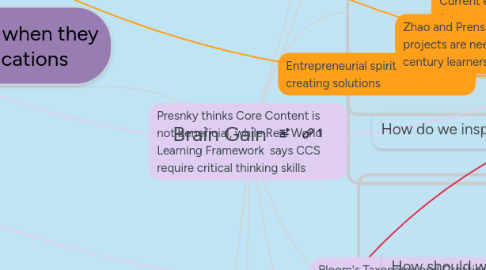
1. Their world is vastly different than what we grew up in. These students are digital natives, so this is the only society they have known.
1.1. Volatility
1.2. Uncertainty
1.3. Complexity
1.4. Ambiguity
1.5. Accelerated change
2. Technology is an extension of our human activity
2.1. Digital Wisdom: Combining what humans do well with what technology does better
2.2. Digital Cleverness: The physical technology; being able to hack
2.3. Digital Stupidity: Not backing up data and plagiarizing
3. Zhao agrees that there is a need for change in education, leaning away from common core and "cellophane students."
3.1. Entrepreneurial Spirit
3.2. Creativity
3.3. Capitalize the strengths of each student
4. Zhao's new education system
4.1. Curriculum: personalized learning
4.2. Pedagogy: Project-based learning
4.2.1. Example of personalized learning in Nashville, TN
4.3. Context: Globalized campus
5. Students learn more when they have real-world implications
5.1. Common Core Standards require critical thinking skills within core subjects
5.2. Revised Bloom's help place emphasis on high-level thinking with integration of cognitive processes
5.2.1. Cognitive Complexity refers to the interaction with the content, not the technology.
5.3. Most of the high level cognitive processes are more project-oriented
6. How do we grow good people?
6.1. Teaching them
6.1.1. New core
6.1.1.1. Effective Thinking
6.1.1.1.1. Critical and Creative Thinking, Problem-Solving, Self-Knowledge
6.1.1.2. Effective Action
6.1.1.2.1. Innovation, Mindset, Resilience, Leader In Me Habits
6.1.1.3. Effective Relationships
6.1.1.3.1. Communication, Citizenship, Conflict Resolution, Ethics, Politics
6.1.1.4. Effective Accomplishments
6.1.1.4.1. Projects and Problems of all sizes and types
6.1.2. Digital Wisdom
7. How do we inspire young people?
7.1. Giving them
7.1.1. Respect, Empathy, Choices, Challenges
7.1.2. Faith to run their own world
8. How should we teach?
8.1. Helping students follow their passions
8.2. Partnering
8.3. Focusing on Thinking, Acting, Relating, and Accomplishing
8.4. Future-cating
9. How can we help?
9.1. Listening non-judgementally
9.1.1. Give our young people a voice
9.2. Create a relationship of mutual respect
9.3. Stop underestimating our young people
9.3.1. Young people want their education to be real-world, not just relevant.
